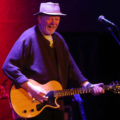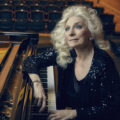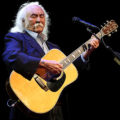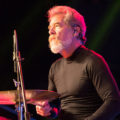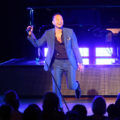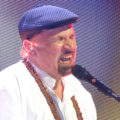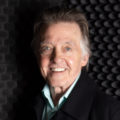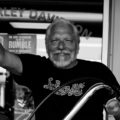Byrd, Burrito Brother and Desert Rose Band’s Chris Hillman turns the pages of “Time Between”
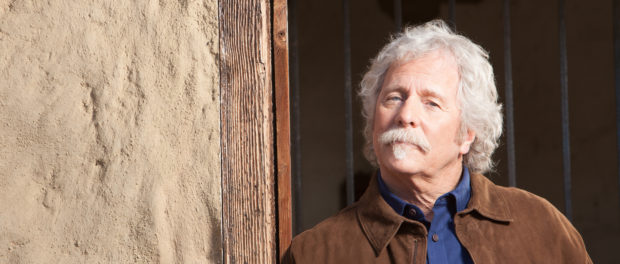 Photo provided by Lori Stoll
Photo provided by Lori Stoll
Co-founding The Byrds, whose landmark recordings throughout the 1960s include “Mr. Tambourine Man,” “Turn! Turn! Turn! (To Everything There Is A Season),” “Eight Miles High” and “So You Want To Be A Rock ‘N’ Roll Star,” would’ve been enough to enshrine bassist Chris Hillman in the history books.
However, he kept right on blazing trails with the late great Gram Parsons and future Eagle Bernie Leadon in The Flying Burrito Brothers, arguably kicking off the entire country rock movement before riding off into the sunset in the early ‘70s.
Shortly thereafter, he teamed with Stephen Stills in Manassas, then aligned with star songwriter J.D. Souther and Buffalo Springfield’s Richie Furay in Souther–Hillman–Furay, though it was actually The Desert Rose Band that lasted longest throughout the ‘80s and ‘90s.
In other words, the Rock and Roll Hall of Famer has tons to write about in “Time Between: My Life As A Byrd, Burrito Brother, And Beyond” (along with family, spirituality and overcoming a few near-death experiences), which he thoroughly outlines for Chicago Concert Reviews on the phone from his California home.
Share a few of the frequent comments you received, along with something unexpected.
Chris Hillman: I’ve gotten such great response to the book. A lot of what I’ve heard that really means a lot to me is when people say, “you’re really a good writer.” Scott Bomar heads up the publishing division of BMG. He had read a couple of the chapters and said, “we don’t need a co-writer” and that really meant a lot. Consequently, people have written me and said, “it flows so well.” I really wrote it very minimalistic. It’s as if you and I are driving cross country. “Well, here’s what happened in 1960. Then I did this.” That’s the way I wrote the book. It worked with a lot of people that way…Very rarely someone would say, “I think that happened differently and this happened.” I said, “you’re probably right…”
 How have any of your former bandmates reacted?
How have any of your former bandmates reacted?
Hillman: Roger McGuinn wrote me and loved the book. Stephen Stills wrote me and he loved it. He said, “I had no idea you had horses growing up. That’s another thing we have in common.” He was very complimentary, Roger was very complimentary and just about everybody I worked with that had read the book was pretty upbeat about it.
Many books about The Byrds and The Flying Burrito Brothers have inaccuracies. What were misconceptions you wanted to clear up?
Hillman: Well, I couldn’t specifically give them to you, but a few of the past books that have been written were very negative describing an event that we were involved in and I’m going “no, that’s not really what happened.” There’s 17 versions of The Byrds on the Grand Ole Opry, but since I was there that night, I told the story. I mentioned Gram deciding to do his song, “Hickory Wind,” instead of the one we supposed to do, which really angered the people that were hosting us. At the moment he did that, we were all involved and thought it was really hip to do that. In hindsight, about a year later, I thought, “that was really disrespectful what we did,” so I cleared that up. Basically as diplomatic as I was, I loved Gram Parsons and he was great to work with for a while, but then I had to eventually fire him. I couldn’t work with him and he wasn’t really working with the rest of us in that sense in a positive way. I cleared that up and cleared up some other things, like the 12 versions of [The Byrds on] “The Ed Sullivan Show.”
That was the original intent, and to write something for my kids. When I started the book seven years ago, my daughter was just in undergrad at college and my son was just getting out of high school. I wasn’t being very proactive, but Scott Bomar heard I was writing a memoir, asked if he could read some of it and we went from there. He is a great editor and he was really helpful, as was Connie, my wife. She had not read any of the book prior to that and she would say, “maybe you should enhance this.” I rewrote most of the book once we had a publishing deal and I got rid of a lot of stuff that was just overkill.
What do you hope readers will take away from the faith and health components?
Hillman: I would hope that they would look at it as “don’t ever give up.” We’re all gonna be confronted with trials. It’s like the old gospel songs I used to sing in bluegrass [about] troubles and trials. That’s part of life, but to keep strong and keep the faith. As things would fall apart around me, I would figuratively get back up on my feet and keep going forward. I think that’s something we all need to try and adhere to and continue on through illness, family issues and even job-related things. I read about the COVID lockdowns and it’s affecting people in such a down way. Statistics for suicide and all of that is pretty amazing where people have literally lost their jobs and their businesses. It’s horrible. The worst part of this whole deal right now is people’s lives getting destroyed by the lockdown.
It sounds like 2018’s “Sweetheart Of The Rodeo” Tour with Roger and Marty Stuart came at just the right time after some personal setbacks. Can you explain how that came together?

The Byrds photo provided by Chris Hillman
Did that open any kind of door towards a Byrds reunion with David Crosby?
Hillman: No. Tom Petty would’ve been the only guy to have probably made that happen and I’ll tell you why. Tom and Roger were very, very close friends. I knew Tom since 1978. I didn’t know him as well as I got to know him after working with him for six weeks on my album, [2017’s “Bidin’ My Time], but Tom knew David too. He would’ve been the guy that would’ve put us in the studio. Otherwise, I don’t think it’s ever gonna happen at this point in time. Look, the business is not really [what it used to be]. I don’t know if I’ll even make another album and that’s okay. In fact, I told Tom in one of our last conversations, “thank you for producing this record. It’s a great way to end it all.” He said, “what are you talking about? I’m not done with you. I want to do an electric, a rock & roll and a country album with you.” I said “really?” We never got to do that unfortunately. He was the only guy that could’ve made the Byrds happen. I firmly believe that and I think Roger would agree with me on that unfortunately.
What do “Mr. Tambourine Man” and “Turn! Turn! Turn!” mean to you now?
Hillman: I think we picked two great songs. I think we sort of were hesitant about “Mr. Tambourine Man,” only because when we first heard it, it was in a different time frame. It was in more of a 2/4 time, like a bluegrass tune or a country song. Kudos to Roger McGuinn, who rearranged it and put it in 4/4 time. You could actually dance to it. [Writer Bob] Dylan commented on that when he heard our version. “God, you can dance to this. This is great.” He was all in favor of it. Both those songs were really good, and after, we were given some good advice from our manager at the time. He said, “go for depth and go for substance in your music. Make music you can be proud of in 40 or 50 years.” That was wonderful advice. Both of those songs hold up really well.

The Flying Burrito Brothers photo provided by Chris Hillman
You write about The Flying Burritos Brothers having inconsistent record sales and shows. How do you feel like the group’s legend has grown over the years?
Hillman: It’s gotten quite interesting. We couldn’t get arrested when we were together, the original band in ‘68-‘69. We couldn’t get on country radio. We barely got on FM rock radio. I think the songs Parsons and I wrote were good. They held up cause a lot of people covered them. The ultimate stamp of approval is when somebody else covers one of the songs that you’ve written. Dwight Yoakam, K.D. Lang and Beck [are a few examples]. Emmylou [Harris] was always recording one of our tunes, which was great. The band didn’t really start to sound good until Gram left and I have to be honest with you about that. I felt like we were really lazy in the execution of the music. I think after Gram left, I went, “okay, I’m gonna have to get this thing going,” cause we had gigs and we were still moving forward.
We did a couple of other albums after that. Both of them were highly acclaimed, and all of a sudden, they were selling. One was just called “The Flying Burrito Bros” and the last album we did was “Last Of The Red Hot Burritos.” It was a live album and it’s smoking. We did rock & roll and we did country/bluegrass on that album. It was a really good record and one of my favorites. I had [rhythm guitarist] Rick Roberts singing with me, who went on to start Firefall, and [pedal steel/lead electric guitarist] Al Perkins, who worked with me in The Flying Burrito Brothers, Manassas and Souther–Hillman–Furay. He’s a fantastic musician and there you go.
How much do you feel like your time as a Burrito Brother with future Eagle Bernie Leadon built the foundation for what wound up becoming their band?
 Hillman: I think a lot. I think [The Byrds’] “Sweetheart Of The Rodeo” album opened up the floodgates, and then from there, Parsons and I start The Flying Burrito Brothers. Bernie is in The Flying Burrito Brothers for a while before he goes into the Eagles. All kinds of things started to happen: The Flying Burrito Brothers, Poco, Pure Prairie League and The Nitty Gritty Dirt Band, who get an award for being together so long. All these West Coast country rock bands embracing vocal harmonies led right to the Eagles. The Eagles were really great when they started and they still are. Initially, they started out as a four-piece country rock band: Randy Meisner, Bernie Leadon, Don Henley and Glenn Frey. I like that version of the Eagles a lot. I think Glenn and Don were really smart guys. They watched all the rest of the us, saw what things not to do in forming their band, continued on their quest and they’re still together.
Hillman: I think a lot. I think [The Byrds’] “Sweetheart Of The Rodeo” album opened up the floodgates, and then from there, Parsons and I start The Flying Burrito Brothers. Bernie is in The Flying Burrito Brothers for a while before he goes into the Eagles. All kinds of things started to happen: The Flying Burrito Brothers, Poco, Pure Prairie League and The Nitty Gritty Dirt Band, who get an award for being together so long. All these West Coast country rock bands embracing vocal harmonies led right to the Eagles. The Eagles were really great when they started and they still are. Initially, they started out as a four-piece country rock band: Randy Meisner, Bernie Leadon, Don Henley and Glenn Frey. I like that version of the Eagles a lot. I think Glenn and Don were really smart guys. They watched all the rest of the us, saw what things not to do in forming their band, continued on their quest and they’re still together.
Then you joined Stephen Stills in the beloved but short-lived Manassas. What’s your take?
Hillman: I think it lasted as long as it should have, two years. Stills was at the top of his game then. I learned a lot of music from him and we wrote together. It got to about the end of the second year and he gets summoned by Crosby and [Graham] Nash to get back with CSN. It was like they took a three-year break. Then the minute that starts to fade away, I get a call about the Souther–Hillman–Furay Band as an idea. I knew Richie from the Buffalo Springfield and I was getting to know J.D., but I thought it was a great idea because I admired both of them. I went from Manassas to SHF and off we went. There’s always something good happening in my life.
Initially, when I was younger, I thought I would go for the next semester of university, but there was always a door opening for me. I was supposed to play music and that was fine. That’s what I wanted to be, a musician. I didn’t want to be Bruce Springsteen or Van Morrison or any of those guys. I probably wasn’t good enough back then. I really was a musician, and as Tom Petty said another time in one of his last interviews, “I don’t think Chris ever liked show business.” I was laughing when I read it. Boy, did he get that right! I didn’t care about riding in a limousine. I was a musician and I loved working with other people. Eventually I led the band, wrote the songs and did all that with The Desert Rose Band, which became the longest band I was ever in and we were very successful in country music.
Were you used to the recognition by then or did keeping a constant presence on the country charts with The Desert Rose Band come as a surprise?
Hillman: I couldn’t believe that we were in the Billboard Top Ten. We got up to number three on our second release. I said to my wife, “this isn’t supposed to happen. What is going on here?” Then we had a string of successes of single records going out and we worked with some wonderful people that were helpful to us. The Oak Ridge Boys were incredibly helpful when we started out. They took us out on a tour and had us opening Las Vegas for them. We didn’t even have a record cut yet, so they were great. Working with Reba McEntire and The Judds was wonderful. Country music was always known for a real camaraderie between all the artists and same as in rock too.

The Desert Rose Band photo provided by Jay Dusard
What role has Chicago played throughout your entire career?
Hillman: Huge! I remember playing McCormick Place in ‘65 with The Byrds. One of the theatres we played, we came up from underneath on the elevator, but I can’t remember [the name]. The kids started rioting, so they stopped the show after four songs, but Chicago played a big part. Roger grew up in Chicago and went to the Old Town School Of Folk Music. That’s how he learned guitar and banjo. I have played the Old Town School a few times, and actually, I’m still booked for May 16 at the City Winery. I hope that happens, and if things are still locked up, I’m sure they’ll move it to the fall of 2021…I’m ready to get on the stage. I’d like a few more before I close the guitar case, so to speak. I sat in with John Jorgenson’s bluegrass band a few months ago. It was an outdoor, drive-up show. I sang a song and then everybody honks their horns when you’re done with the song. Good Lord, I don’t want this to be my last show when I’m hearing them go “beep, beep, beep, beep.” They all meant well and it’s interesting, but hopefully we can have that all resolve itself soon!
For additional information on Chris Hillman, visit ChrisHillman.com.

